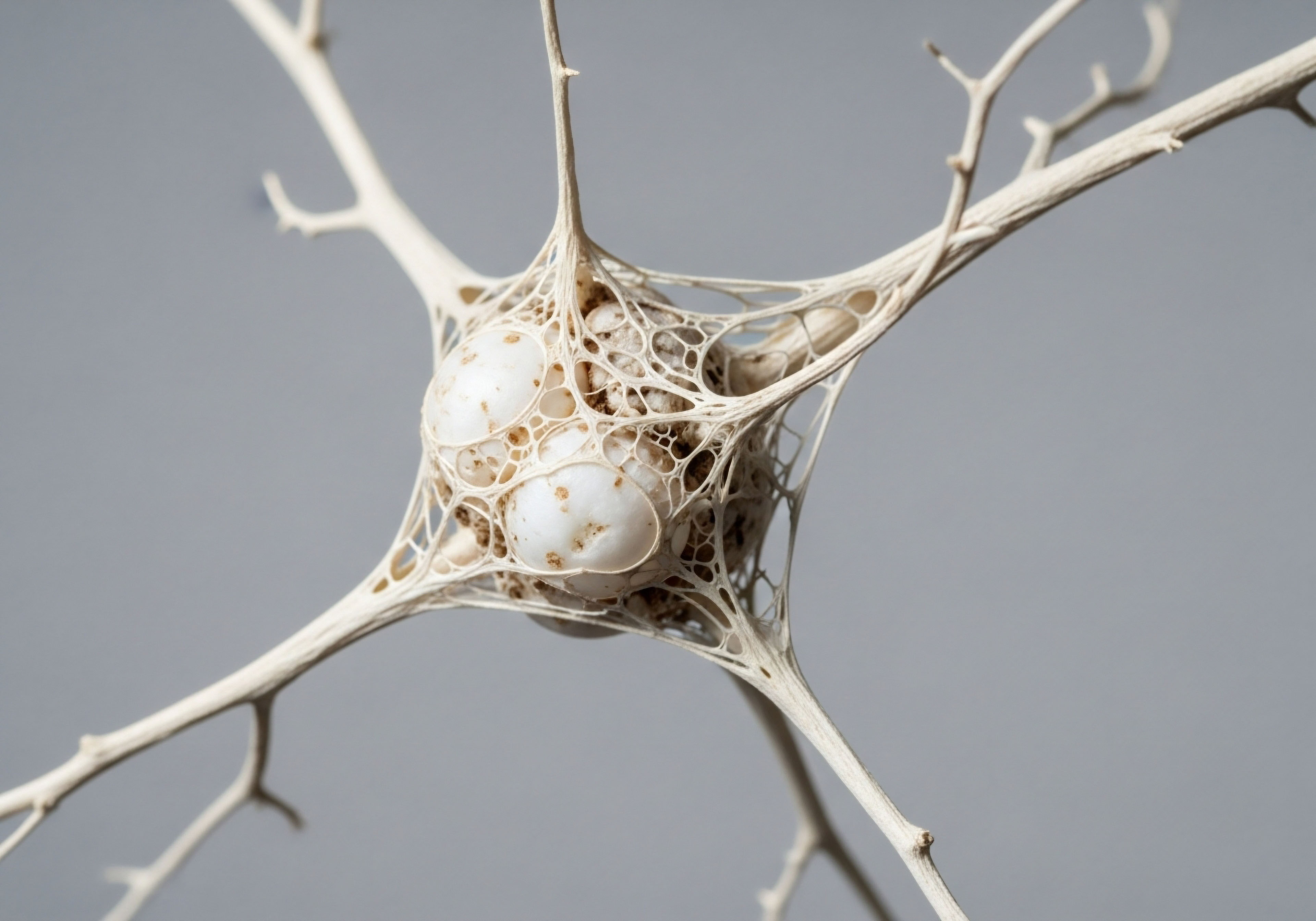

Fundamentals
The experience of navigating midlife often brings with it a constellation of shifts, some subtle, others profoundly impacting daily life. Perhaps you have noticed moments of mental haziness, a fleeting word on the tip of your tongue, or a slight difficulty in maintaining focus during tasks that once felt effortless.
These cognitive changes, frequently described as “brain fog,” are not imagined; they represent a tangible reality for many individuals transitioning through menopause. Your lived experience of these symptoms is a valid signal from your biological systems, indicating a recalibration underway. Understanding these internal communications is the first step toward reclaiming mental clarity and vitality.
At the core of these transformations lies the intricate dance of the endocrine system, a sophisticated network of glands and hormones that orchestrate nearly every bodily function. Hormones, in essence, serve as the body’s internal messaging service, transmitting vital instructions between cells and organs.
During the menopausal transition, the ovarian production of key hormones, particularly estrogen and progesterone, undergoes a significant decline. This shift is not merely a reproductive event; it sends ripples throughout the entire physiological landscape, including the brain.
The brain, a highly responsive organ, possesses a rich distribution of receptors for these very hormones. When estrogen levels, for instance, begin to diminish, the brain’s capacity for certain functions can be affected. This can influence aspects such as memory consolidation, processing speed, and emotional regulation.
Progesterone, too, plays a vital role, with its metabolites acting as neurosteroids that influence neuronal excitability and mood stability. The reduction in these neurosteroids contributes to the altered cognitive and emotional states reported during this period.
Within this complex hormonal environment, another class of signaling molecules, known as peptides, offers a compelling avenue for support. Peptides are short chains of amino acids, the building blocks of proteins, and they act as highly specific communicators within the body.
They can influence a wide array of biological processes, from growth and repair to immune function and neurological activity. Some peptides naturally occur in the body, while others are synthetic analogs designed to mimic or enhance these natural signaling pathways. Their precise actions offer a targeted approach to addressing specific physiological needs, including those related to brain function during hormonal transitions.
Cognitive shifts during menopause are real experiences, stemming from natural hormonal recalibrations within the body.
The brain’s adaptability, known as neuroplasticity, allows for continuous adjustments and the formation of new neural connections. However, age-related hormonal changes can impede this process. Supporting the brain’s inherent capacity for self-repair and optimization becomes paramount. Peptide therapies represent a sophisticated tool in this endeavor, working in concert with the body’s own systems to restore balance and enhance function. They offer a physiological approach, aiming to recalibrate rather than override, the body’s natural intelligence.

Understanding Hormonal Influence on Brain Health
The intricate relationship between ovarian hormones and brain function extends beyond simple presence or absence. Estrogen, particularly 17β-estradiol, exerts widespread effects on brain regions critical for learning and memory, including the hippocampus and prefrontal cortex. It influences synaptic plasticity, mitochondrial function, and cerebrovascular integrity, all of which are vital for optimal cognitive performance.
When estrogen levels fluctuate or decline, as they do during perimenopause and menopause, these neuroprotective and cognitive-enhancing effects can diminish, contributing to the experience of brain fog and memory lapses.
Progesterone and its metabolites, such as allopregnanolone, also play a significant role in brain health. These neurosteroids modulate neuronal excitability by interacting with neurotransmitter systems, including GABA, serotonin, and dopamine. Allopregnanolone, for example, has a neuro-calming effect and supports sleep, a crucial component of cognitive restoration.
A reduction in these neurosteroids can contribute to mood instability, anxiety, and sleep disturbances, all of which can indirectly impact cognitive function. The coordinated action of these hormones is essential for maintaining a balanced neurological environment.

The Hypothalamic-Pituitary-Gonadal Axis and Cognition
The Hypothalamic-Pituitary-Gonadal (HPG) axis serves as the central command center for hormonal regulation. The hypothalamus releases gonadotropin-releasing hormone (GnRH), which signals the pituitary gland to produce luteinizing hormone (LH) and follicle-stimulating hormone (FSH). These, in turn, stimulate the ovaries to produce estrogen and progesterone.
During menopause, the ovaries become less responsive, leading to altered feedback signals within this axis. This disruption can have cascading effects on various brain functions, as the brain attempts to adapt to the new hormonal milieu.
The HPG axis is not an isolated system; it communicates extensively with other critical axes, such as the Hypothalamic-Pituitary-Adrenal (HPA) axis, which governs the stress response. Chronic stress, often exacerbated by menopausal symptoms, can further impact hormonal balance and brain function. Understanding these interconnected systems provides a more complete picture of the challenges faced during this transition and highlights the potential for comprehensive, systems-based interventions.


Intermediate
Addressing the cognitive shifts experienced during menopause requires a thoughtful, evidence-based approach that considers the unique biochemical landscape of each individual. Personalized wellness protocols aim to restore physiological balance, moving beyond a one-size-fits-all mentality. Peptide therapies, in particular, offer a precise means of influencing specific biological pathways, thereby supporting brain function and overall vitality during this significant life transition.
The decline in endogenous growth hormone (GH) production, a natural consequence of aging, also contributes to changes in body composition, energy levels, and cognitive performance. Growth hormone-releasing peptides (GHRPs) and growth hormone-releasing hormone (GHRH) analogs work by stimulating the body’s own pituitary gland to produce and release more GH. This approach is considered more physiological than direct GH administration, as it respects the body’s natural pulsatile release patterns.

Growth Hormone Peptide Therapies for Cognitive Support
Several peptides are utilized to optimize growth hormone levels, with potential benefits extending to brain health ∞
- Sermorelin ∞ This peptide is a synthetic analog of GHRH, stimulating the pituitary gland to release GH. Research indicates that GH and GHRH may influence cognitive and neurological domains.
Sermorelin’s action can support neuroprotection and brain function by promoting neuronal growth and repair. It may also improve sleep quality, particularly deep sleep stages, which are essential for memory consolidation and clearing metabolic waste from the brain. Improved sleep indirectly supports cognitive performance.
- Ipamorelin / CJC-1295 ∞ This combination therapy is highly effective in stimulating GH release.
Ipamorelin mimics ghrelin, binding to receptors in the pituitary to trigger GH production, while CJC-1295 is a GHRH analog that prolongs the half-life of GH release. Together, they can lead to a sustained increase in GH levels, which has been associated with improved cognitive function, mental clarity, and focus.
These peptides support neuroplasticity, the brain’s ability to form new neural connections, which is fundamental for learning and memory.
- Tesamorelin ∞ This GHRH analog is particularly noted for its effects on visceral fat reduction, but its impact on overall metabolic health can indirectly benefit brain function by reducing systemic inflammation and improving insulin sensitivity.
- Hexarelin ∞ A potent GHRP, Hexarelin has shown promise in supporting cardiovascular health and tissue repair, which can contribute to overall systemic well-being and indirectly support brain health.
- MK-677 ∞ While not a peptide in the strictest sense (it is a non-peptide growth hormone secretagogue), MK-677 orally stimulates GH release. Its benefits align with those of injectable peptides, including potential improvements in sleep, body composition, and cognitive function.
Growth hormone-releasing peptides offer a physiological pathway to support brain function by enhancing the body’s natural hormone production.
The mechanism by which these peptides support cognition often relates to their ability to increase levels of insulin-like growth factor 1 (IGF-1), a downstream mediator of GH action. IGF-1 plays a crucial role in neuronal growth, survival, and function. It also contributes to neurogenesis, the formation of new neurons, particularly in the hippocampus, a brain region vital for memory and learning.

Targeted Peptides for Specific Menopausal Concerns
Beyond growth hormone optimization, other peptides address specific symptoms that can indirectly impact brain function and overall well-being during menopause ∞
- PT-141 (Bremelanotide) ∞ This peptide targets melanocortin receptors in the brain, primarily the MC4 receptor in the hypothalamus, to stimulate sexual desire and arousal.
While its primary application is for sexual health, improved intimacy and reduced sexual dysfunction can significantly enhance mood, reduce stress, and improve overall mental and emotional well-being, thereby indirectly supporting cognitive function.
It works on the central nervous system, influencing desire and libido directly.
- Pentadeca Arginate (PDA) ∞ A synthetic peptide derived from BPC-157, PDA is recognized for its remarkable properties in tissue repair, healing, and inflammation reduction. Its ability to reduce inflammation, including potentially neuroinflammation, and support tissue regeneration throughout the body, contributes to a healthier systemic environment.
PDA has also shown promise in influencing the brain-gut axis, potentially aiding in mood regulation and cognitive function by affecting neurotransmitter systems. This peptide helps calm inflammatory markers and supports collagen growth, which is vital for connective tissues and overall bodily integrity.
These peptides, when integrated into a comprehensive wellness plan, can address various aspects of menopausal health, from metabolic balance to cognitive clarity and emotional stability. The approach emphasizes supporting the body’s inherent capacity for restoration and optimal function.

Personalized Protocols and Monitoring
The effectiveness of peptide therapies, like any personalized wellness protocol, hinges on precise application and careful monitoring. This involves ∞
- Comprehensive Lab Testing ∞ Baseline hormone levels (estrogen, progesterone, testosterone, DHEA, thyroid hormones), IGF-1, inflammatory markers, and metabolic panels provide a detailed picture of an individual’s internal environment.
- Individualized Dosing ∞ Peptide dosages are tailored to the individual’s specific needs, symptoms, and lab results.
For instance, Testosterone Cypionate for women is typically 10 ∞ 20 units (0.1 ∞ 0.2ml) weekly via subcutaneous injection, with Progesterone prescribed based on menopausal status.
- Administration Routes ∞ Peptides are commonly administered via subcutaneous injection, offering efficient absorption. Some, like PT-141, may also be available as nasal sprays.
- Ongoing Assessment ∞ Regular follow-up appointments and repeat lab tests are essential to assess progress, adjust dosages, and ensure optimal outcomes.
A table summarizing the key growth hormone-releasing peptides and their primary cognitive-related benefits is provided below ∞
| Peptide | Primary Mechanism | Cognitive-Related Benefits |
|---|---|---|
| Sermorelin | Stimulates pituitary GH release (GHRH analog) | Improved sleep quality, neuroprotection, neuronal growth, memory consolidation |
| Ipamorelin / CJC-1295 | Ipamorelin mimics ghrelin; CJC-1295 prolongs GH release | Enhanced mental clarity, focus, neuroplasticity, learning, memory |
| Tesamorelin | GHRH analog, reduces visceral fat | Indirect cognitive benefit via reduced inflammation, improved metabolic health |
| Hexarelin | Potent GHRP | Indirect cognitive benefit via systemic health, tissue repair |
| MK-677 | Oral GH secretagogue | Improved sleep, body composition, potential cognitive enhancement |
The integration of these therapies within a broader framework of hormonal optimization, including targeted Hormone Replacement Therapy (HRT) applications where appropriate, creates a synergistic effect. For women, this might involve low-dose testosterone, progesterone, or even pellet therapy, all designed to recalibrate the endocrine system and support overall well-being, including cognitive function.


Academic
The profound impact of menopause on brain function extends beyond subjective symptoms, reflecting measurable changes at the molecular and cellular levels. A deeper understanding of these underlying biological mechanisms reveals how hormonal shifts contribute to cognitive alterations and, critically, how targeted peptide therapies can intervene. The brain’s susceptibility to hormonal fluctuations is rooted in its extensive network of steroid hormone receptors and its reliance on a delicate balance of neurochemical signaling.
The decline in ovarian steroid hormones, particularly estradiol and progesterone, during menopause directly influences neuronal health and synaptic plasticity. Estradiol, for instance, modulates the expression of genes involved in neuronal survival, synaptic formation, and neurotransmitter synthesis. Its reduction can lead to decreased dendritic spine density in hippocampal pyramidal cells, a structural change associated with impaired memory.
Progesterone and its neuroactive metabolites, such as allopregnanolone, interact with GABA-A receptors, influencing neuronal excitability and contributing to neuroprotection. The withdrawal of these neurosteroids can disrupt the delicate balance of excitation and inhibition in brain circuits, contributing to cognitive and mood disturbances.

Neuroinflammation and Hormonal Aging
A significant contributor to age-related cognitive decline, and particularly relevant during menopause, is neuroinflammation. This chronic, low-grade inflammatory state within the central nervous system is characterized by increased activation of resident immune cells, primarily microglia and astrocytes. While acute inflammation is a protective response, chronic neuroinflammation can lead to neuronal damage, synaptic dysfunction, and impaired neurogenesis.
Hormonal changes during menopause can exacerbate neuroinflammation. Estrogen, known for its anti-inflammatory properties, helps to modulate immune responses in the brain. Its decline can shift the brain towards a more pro-inflammatory state, making it more vulnerable to insults. This “inflammaging” phenomenon, a chronic inflammatory state associated with aging, is further amplified by the loss of ovarian hormones, contributing to cognitive complaints. Peptides offer a compelling strategy to modulate this inflammatory environment.

Peptide Mechanisms in Brain Function
Peptide therapies exert their cognitive benefits through diverse and specific mechanisms ∞
- Growth Hormone Axis Modulation ∞ Peptides like Sermorelin, Ipamorelin, and CJC-1295 stimulate the pulsatile release of endogenous growth hormone (GH) from the pituitary gland. GH, in turn, increases levels of Insulin-like Growth Factor 1 (IGF-1).
Both GH and IGF-1 receptors are widely distributed throughout the brain, including the hippocampus and prefrontal cortex. IGF-1 is a potent neurotrophic factor, promoting neuronal survival, synaptogenesis, and neurogenesis. It also enhances cerebral blood flow and glucose metabolism, vital for optimal brain function.
By restoring more youthful GH/IGF-1 signaling, these peptides can support neuronal health and cognitive performance.
- Neurotransmitter System Modulation ∞ PT-141, for example, acts as a melanocortin receptor agonist, primarily targeting the MC4 receptor in the hypothalamus. Activation of MC4 receptors is linked to increased release of dopamine in the medial preoptic area, a region critical for sexual desire and motivation.
While its direct cognitive impact is less studied, dopamine plays a crucial role in executive functions, motivation, and reward pathways, suggesting an indirect benefit to overall cognitive well-being through improved mood and drive.
- Anti-inflammatory and Regenerative Properties ∞ Pentadeca Arginate (PDA) demonstrates significant anti-inflammatory and tissue-regenerative capabilities.
It works by modulating inflammatory cytokines and promoting collagen synthesis, which is essential for tissue repair. In the context of brain health, PDA’s ability to reduce systemic inflammation can indirectly mitigate neuroinflammation. Some research suggests PDA may influence the brain-gut axis and reduce oxidative stress in the brain, further supporting its potential role in cognitive health.
Peptide therapies influence brain function by modulating growth hormone pathways, neurotransmitter systems, and inflammatory responses.

The Interplay of Biological Axes and Cognitive Health
The brain does not operate in isolation; its function is deeply intertwined with systemic physiological balance. The HPG axis, already discussed, directly impacts the availability of neurosteroids. However, its interaction with the Hypothalamic-Pituitary-Adrenal (HPA) axis, the body’s stress response system, is equally significant. Chronic stress, often heightened during menopausal transitions, can lead to HPA axis dysregulation, increasing cortisol levels. Elevated cortisol can be neurotoxic, impairing hippocampal function and exacerbating cognitive decline.
Furthermore, the gut-brain axis plays a substantial role. The gut microbiome influences systemic inflammation and neurotransmitter production, which in turn affect brain health. Peptides like PDA, with their influence on gut lining integrity and inflammation, may indirectly support cognitive function by fostering a healthier gut environment. This holistic perspective underscores that optimizing brain function during menopause requires addressing the interconnectedness of these biological systems.

Clinical Considerations and Future Directions
The application of peptide therapies for menopausal brain function requires a meticulous clinical approach. This includes ∞
- Biomarker Monitoring ∞ Beyond standard hormone panels, monitoring inflammatory markers (e.g. C-reactive protein, IL-6), neurotrophic factors (e.g.
BDNF, IGF-1), and cognitive assessments provides objective measures of therapeutic efficacy.
- Dosing Precision ∞ The pharmacokinetics and pharmacodynamics of peptides necessitate precise dosing and administration schedules to maximize therapeutic benefit and minimize potential side effects.
For instance, Sermorelin is often administered at bedtime to align with natural GH pulsatility.
- Combination Therapies ∞ Often, a synergistic approach combining different peptides or integrating them with traditional hormone optimization protocols yields superior outcomes. For example, combining CJC-1295 and Ipamorelin can lead to a 3-5 fold increase in GH release compared to Ipamorelin alone.
A deeper look at the mechanistic pathways of key peptides and their impact on brain health ∞
| Peptide Class | Key Peptides | Primary Brain Targets/Pathways | Molecular/Cellular Effects |
|---|---|---|---|
| Growth Hormone Releasing Peptides (GHRH analogs/GHRPs) | Sermorelin, Ipamorelin, CJC-1295 | Pituitary gland, GH/IGF-1 axis, Hippocampus, Prefrontal Cortex | Increased GH/IGF-1, neurogenesis, synaptogenesis, enhanced cerebral blood flow, improved sleep architecture |
| Melanocortin Receptor Agonists | PT-141 | Hypothalamus (MC4 receptors), Dopaminergic pathways | Increased dopamine release, modulation of sexual desire, indirect mood and motivational support |
| Regenerative Peptides | Pentadeca Arginate (PDA) | Systemic inflammatory pathways, Brain-gut axis, Oxidative stress pathways | Reduced inflammation, tissue repair, potential neuroprotection, modulation of neurotransmitter systems |

Can Peptide Therapies Influence Neurotransmitter Balance?
The brain’s intricate network of neurotransmitters, chemical messengers that transmit signals between neurons, is highly sensitive to hormonal fluctuations. Estrogen, for example, influences the synthesis, degradation, and receptor expression of dopamine, serotonin, and norepinephrine. A decline in estrogen can disrupt this delicate balance, contributing to mood swings, anxiety, and cognitive difficulties.
While some peptides directly modulate neurotransmitter systems, others exert indirect effects. Growth hormone, for instance, has been linked to improved mood and emotional stability, potentially through its broad influence on brain health and sleep.
The scientific literature continues to expand, revealing the complex interplay between peptides, hormones, and neurological function. The goal remains to translate this sophisticated understanding into actionable strategies that empower individuals to optimize their cognitive health and reclaim their full potential during the menopausal transition.

References
- Del Río, J. P. et al. “Steroid Hormones and Their Action in Women’s Brains ∞ The Importance of Hormonal Balance.” Frontiers in Public Health, vol. 6, 2018.
- Gleason, C. E. et al. “Menopause, hormone therapy and cognition ∞ maximizing translation from preclinical research.” Frontiers in Aging Neuroscience, vol. 7, 2015.
- Liu, J. M. et al. “From Menopause to Neurodegeneration ∞ Molecular Basis and Potential Therapy.” International Journal of Molecular Sciences, vol. 21, no. 14, 2020.
- Maki, P. M. and Henderson, V. W. “Oestrogen and cognition in the perimenopause and menopause.” British Journal of Pharmacology, vol. 174, no. 18, 2017.
- Rocca, W. A. et al. “Systematic review and meta-analysis of the effects of menopause hormone therapy on risk of Alzheimer’s disease and dementia.” Frontiers in Aging Neuroscience, vol. 15, 2023.
- Shumaker, S. A. et al. “Menopause and cognitive impairment ∞ A narrative review of current knowledge.” World Journal of Clinical Cases, vol. 11, no. 27, 2023.
- Vukojević, J. et al. “Pentadecapeptide BPC 157 and its synthetic form, pentadeca arginate, play a major role in supporting tissue repair, decreasing inflammation, and promoting recovery from various conditions and injuries.” Medical Anti-Aging White Paper, 2024.
- Sikirić, P. C. et al. “Pentadecapeptide BPC 157 and its synthetic form, pentadeca arginate, play a major role in supporting tissue repair, decreasing inflammation, and promoting recovery from various conditions and injuries.” Medical Anti-Aging White Paper, 2024.
- Seiwerth, S. et al. “Pentadecapeptide BPC 157 and its synthetic form, pentadeca arginate, play a major role in supporting tissue repair, decreasing inflammation, and promoting recovery from various conditions and injuries.” Medical Anti-Aging White Paper, 2024.
- A review of current knowledge on Sermorelin and its potential biological functions. Ghana Web, 2024.
- The Role Of Sermorelin In Improving Sleep Quality And Recovery. Regenics, 2024.
- Can Sermorelin improve sleep quality and cognitive function? Heally, 2025.
- Can Sermorelin Therapy Support Brain Function as You Age? Genesis Lifestyle Medicine, 2025.
- What is CJC 1295 Ipamorelin? Southern California Center for Anti-Aging, 2024.
- WHAT IS CJC 1295 IPAMORELIN? Eros Men’s Health, 2024.
- CJC 1295 | Anti-Aging, Hormone Specialists & Functional Medicine. Re-new Institute, 2024.
- Best CJC-1295/Ipamorelin Beverly Hills & Newport Beach. AsandraMD Anti-Aging, 2024.
- Peptide Therapy ∞ CJC-1295 + Ipamorelin. Envizion Medical, 2025.
- What is PT 141? Bremelanotide Peptide Guide. Prime IV Hydration & Wellness, 2024.
- PT-141 Side Effects, Duration, & Benefits. Invigor Medical, 2024.
- What Is PT-141? Mechanism, Benefits, and How It Works. The Wellness Company, 2025.
- PT-141 FOR MEN ∞ A NEW DRUG TO TREAT ERECTILE DYSFUNCTION AND LOW LIBIDO. Hormone Therapy MD, 2024.
- PT 141 Peptide Pros and Cons ∞ Understanding Its Benefits And Risks. Concierge MD, 2025.
- Exploring Pentadeca Arginate Complex ∞ A Breakthrough in Wound Healing and Tissue Regeneration. Intercoastal Health, 2024.
- Pentadeca Arginate Peptide ∞ A Breakthrough Healing Solution. The Catalyst Clinic London & NYC, 2024.
- Pentadecapeptide BPC 157 Germantown, WI | Speed Healing. Forward Healthy Lifestyles, 2024.
- Pentadeca-Arginate Peptide ∞ The New Frontier in Healing, Recovery, and Gut Health. Functional Health, 2025.
- Molecular Mechanisms of Neuroinflammation in Aging and Alzheimer’s Disease Progression. International Journal of Molecular Sciences, vol. 24, no. 13, 2023.
- The Power of Peptides in Reducing Brain Inflammation. PROVOKE Health, 2024.
- Immunosenescence and Aging ∞ Neuroinflammation Is a Prominent Feature of Alzheimer’s Disease and Is a Likely Contributor to Neurodegenerative Disease Pathogenesis. International Journal of Molecular Sciences, vol. 24, no. 11, 2023.
- Neuroinflammation Associated with Aging Sensitizes the Brain to the Effects of Infection or Stress. Frontiers in Aging Neuroscience, vol. 14, 2022.
- Inflammaging and Brain Aging. International Journal of Molecular Sciences, vol. 24, no. 12, 2023.

Reflection
The journey through menopause is a deeply personal experience, marked by unique physiological and emotional shifts. The insights shared here, from the foundational understanding of hormonal influences on brain function to the precise mechanisms of peptide therapies, serve as a guide. This knowledge is not merely academic; it is a powerful tool for introspection, prompting you to consider your own biological systems with renewed awareness.
Understanding the intricate connections between your endocrine system, metabolic health, and cognitive vitality empowers you to become an active participant in your wellness journey. The path to reclaiming vitality and function without compromise is a collaborative one, requiring both scientific understanding and a deep respect for your individual experience. This exploration of peptide therapies and hormonal optimization represents a frontier in personalized health, offering avenues for support that were once unimaginable.

What Steps Can You Take Next?
Armed with this information, consider what feels most resonant for your own health narrative. Perhaps it is a deeper dive into understanding your current hormonal status through comprehensive lab testing. It might involve exploring how specific peptide protocols could align with your personal health goals. The aim is always to restore balance, not to impose a rigid solution.
Your body possesses an innate capacity for healing and adaptation. The role of advanced clinical protocols is to support and amplify this inherent intelligence. As you move forward, remember that true wellness is a continuous process of learning, adapting, and honoring your unique biological blueprint. The information presented here is a starting point, a catalyst for a more informed and empowered approach to your health.



